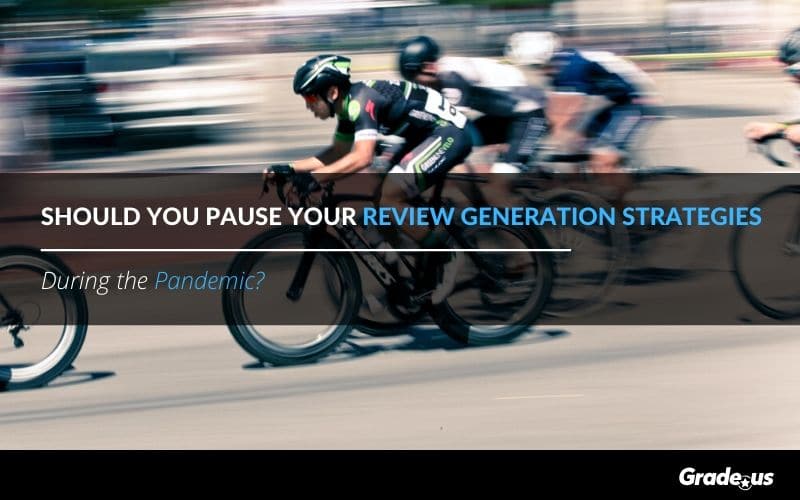What are the consequences of requesting reviews?
Is it a bad idea to request reviews during a crisis or stressful event? The depends on your goals, the culture of your business, and your customer’s expectations overall. If you choose to request reviews, it also depends on your approach.
We’ll tackle this from two perspectives.
- The rationale for pausing your review management campaigns
- The rationale for maintaining your review management campaigns
We’ll also discuss whether you should request reviews from customers, how to do it, and how to ensure that you’re sending the right messages to your customers.
When requesting reviews is a bad idea
You’re probably familiar with Maslow’s Hierarchy of Needs. In his 1943 paper, A Theory of Human Motivation, Maslow outlines the needs that drive behavioral motivation; these needs are the basis of human behavior.
What does this have to do with reviews?
Maslow’s work, while fascinating, doesn’t really explain why it would be an inappropriate idea to continue to request reviews from customers.
Ah, but it does.
Here’s a quote from Wikipedia, outlining how Maslow’s Hierarchy of Needs affects your review management campaigns.
“The original hierarchy states that a lower level must be completely satisfied and fulfilled before moving onto a higher pursuit. However, today scholars prefer to think of these levels as continuously overlapping each other. This means that the lower levels may take precedence back over the other levels at any point in time.”
Emphasis added
This pandemic has changed customer priorities. Right now, the world is focused on two things:
1. Physiological needs. Food, water, shelter, resources, toilet paper, sanitizer, etc. The essential items needed to maintain adequate levels of survival.
2. Safety and security needs. Avoiding infection, maintaining stable employment, consistent access to resources, protecting and providing for their families.
Does this mean customers are completely disinterested in purchasing products and services?
It depends.
It depends on your industry and the products or services you offer. If your product or service helps customers address their safety or physiological needs, directly or indirectly, then you’re in demand. So when would requesting reviews be a bad idea?
When it’s perceived as self-serving.
Adrianne Pasquarelli, made an important point about customer expectations, in her Ad Age post.
“When there are serious changes in lifestyle and life circumstances, there is a fairly dramatic change in preference for brands that consumers use, and their perceptions about those brands.”
Here’s the implication.
“As consumers change to adopt new behaviors and habits, they’re sticking by the brands they’ve long trusted to get them through and beyond the crisis. The change from ‘novel and trendy’ to ‘tried and true.'”
It’s about trust.
Customers will prioritize the people, organizations, and brands that have gotten them through this current crisis. Organizations that are focused on taking care of their customers will grow despite the pandemic. Here’s an example from Education Week that reinforces this point.
Susan Enfield is the superintendent of Highline Public Schools, near Seattle, one of the first regions where life was upended by the coronavirus outbreak.
She has a message for education companies offering their services: They can help her district by going quiet for a while.
Enfield says she’s been inundated with inquiries from vendors touting products they believe will meet her 20,000-student district’s needs during these bewildering times. In a recent Twitter post, Enfield told them she’d heard enough.
“It’s 9:00 pm & I finally have time to send this message: to every vendor, solution partner, researcher, education advocate, etc. please stop. Just stop.” she wrote. “My WA superintendent colleagues & I confronting school closure need to focus on our communities. Let us do our jobs.”
Here’s what separated the messages Enfield wanted to hear from those she didn’t.
“I appreciate those who are just saying, “I’m here for whatever you need, I’m not trying to push anything.” But I really resent those who see this as an economic opportunity for themselves. I respect that everyone has to make a living, but being so tone-deaf when people are really, really scrambling to meet the basic needs in their community, is pretty appalling.”
This is the problem with review requests right now.
There’s a chance these review requests will be seen as self-serving or tone-deaf. You genuinely care about your customers, and you want the best for them; you’re just doing your best to survive. If this happens, it’s more likely to do more harm than good in the long run. Hard sells, repeatedly “following up,” cold/hard sells, these aren’t viable strategies right now.
So what is viable right now?
An emphasis on taking care of your customers, making sure that the people you serve are okay, that they have what they need. Your customers want to see that you’re focused on them. If you make sure your attention is genuinely focused on them (where it belongs), they’ll take care of you in the long run.
What about requesting reviews?
Requesting reviews during the pandemic can work
According to Bloomberg, several industries are seeing significant growth during the pandemic. The US Chamber of Commerce lists several industries that are actually experiencing growth during the pandemic.
- Restaurants
- Cleaning services
- Delivery services (of all kinds)
- Movers
- Meal prep services
- Landscaping and yard care companies
- Bread-baking companies
- Subscription services
- Gardening suppliers
- Telehealth services
There are more industries that are experiencing growth during the pandemic. What’s really significant is the way businesses affected by the pandemic are adapting to their current circumstances.
- New York-based grocery chain DeCicco & Sons set 30 minutes aside exclusively for senior citizens.
- Familiar Creatures, a Richmond, Virginia-based advertising agency, created a clever website to guide locals to restaurants and breweries who are struggling.
- Fitness, wellness, and yoga studios have begun offering live-streamed classes.
- Horderly, a professional organizing service that helps people sort their homes, created a new virtual organizing service in three days to keep their business afloat.
- Manhattan-based hair salon James Corbett Studio increased sanitation, avoids hosting more than five clients at a time inside the salon, and added new in-home house calls, video call consultations and customized color kits that can be delivered.
- Moonrise Distillery in Clayton, Georgia began producing free hand sanitizer for their local community, creating goodwill and safety for those in need.
- Seattle bakery, Piroshky Piroshky, decided to partner with nearby popular business Pike Place Chowder to offer a new home delivery service.
- Teambuilding, a 100% remote company, typically hosts in-person events for business clients but decided to focus on virtual team-building events in response to COVID.
Businesses are adapting.
What does this mean for you?
If you’re in a vertical where you’ve adapted successfully, where customers are continuing to spend freely, or you’re indispensable to a particular market, it may be a good idea to request reviews. If it’s business as usual (with a few modifications), then you’re far less likely to come off as cold hearted or insensitive with your review management campaigns.
It’s still a big if, though.
You’re still going to want to ensure that your customers are taken care of.
- If you're able to offer any particular incentives, bonuses, or rewards do so.
- Are your customers nervous about their ability to pay for your products or services? Give them options.
- Help your customers stretch their dollars whenever possible.
- Support your local community and key organizations (hospitals, shelters, churches, etc.), so those in need have help.
- Volunteer your time, resources, connections, or expertise to serve those in need.
If you’re looking to make a tremendous impact on your local community or your customers, this is an excellent place to focus your time and attention during the pandemic.
Why start there?
Because it sets an essential baseline in your customer relationships, it lets your customers know that you care about what happens to them. More importantly, this baseline is based on actions, not words. You’ve shown your customers that you’re giving them the care, guidance, and protection you’ve promised.
Are you doing that already? Great!
Once you’ve done that, you can make conditional review requests based on your customer’s needs. Focus your time and attention on your loyalists, your admirers first. These are the customers who believe in you; they’re already aware of the fact that you care about them.
They’re far more likely to approve your review request.
There are consequences for requesting reviews
Is it a bad idea to request reviews during a crisis or stressful event? The answer depends on your goals, the culture of your business, and your customer’s expectations overall. Your customers want to know that you care about them. They want to see that you’re focused on their needs.
Hard sells and cold sales pitches?
These are the kinds of requests that send the wrong message. Sending the wrong message to your customers is the worst thing you can do; there are severe, long term consequences.
Your customers are focused on safety and security.
Prioritize your customers, and they’ll prioritize your business. They’ll see you as one of the brands that brought them through this current crisis. Serve your customers, and you’ll grow despite the pandemic, no consequences necessary.









